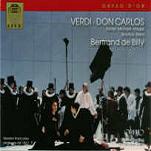This more-than-complete French version of Verdi’s great Don Carlos, containing more than four hours of music, was taped live in Vienna on October 18, 2004. There are many musical moments recorded here that never have been recorded before–all of the cuts made before the opera’s 1867 Paris debut have been reinstated. There is more music here than Andrew Porter discovered in the ’70s, and more than was included in both previous French recordings (the far-from-great Abbado and the excellent Pappano). We get an extended version of the Carlos/Posa duet, a different take on the Posa/Philip confrontation, the exchange of masks between Eboli and Elisabeth, the ballet, a duet between the two women before “O don fatal”, an extra section in the final Carlos/Elisabeth duet, and more. It’s thrilling to have it all available–more fine insights into Verdi’s creative process.
Apparently the physical production was something to behold: the Auto-da-fé took place all over the opera house, and the ballet was performed as “Eboli’s Dream” of an at-home evening with Carlos, with Elisabeth and Philip popping in for dinner–and there are moments when stage movements are all too obvious. But they’re hardly a problem. On the superb side is the leadership of Bertrand de Billy, who keeps the opera moving with equal emphasis given to both public (political) and private moments, and the work of Vienna’s orchestra and chorus. You could hardly ask for more luscious playing–just listen to the melancholy strings at the start of the Prison Scene–or more intelligent, emotionally correct tempos. But those who like their Verdi voices juicy and grand may be disappointed.
Granted, the French version of the opera is somewhat more soft-edged than the Italian, but for the most part the cast assembled here, though fine artists, will be seen as lacking the true Verdian sound. Ramon Vargas, an ever more convincing and elegant artist, is a size light for Carlos, but he sings handsomely (a squeezed high note or two notwithstanding) and “gets” this sensitive character. Fans of Domingo, Bergonzi, and even better, José Carreras, will want a meatier sound. Soprano Iano Tamar has a voice closer to a real Verdian soprano, and she’s comfortable in the role of Elisabeth, but she has pitch problems that can bother.
Bo Skovhus is a Posa in the Thomas Hampson mold, and he sings with even more feeling and shading; his death scene is a lesson in pianissimo projection. Nadja Michael’s Eboli is closest to the real ticket–Cossotto, Barbieri, Baltsa–and she sings the daylights out of “O don fatal”. However, her voice is far from lovely. Alastair Miles’ Philip is superbly created and sung–he mocks Posa in their duet and really gets scrappy with the Inquisitor (a sonorous, dangerous-sounding Simon Yang)–we fear him and feel for him at the same time. Dan Paul Dumitrescu sings the role of the Monk/Charles V with great authority. Both the Count of Lerma and the Heavenly Voice are sung by singers with dreadful tone.
After commentary like this, you may not want to hear this set, but I recommend it. The overall performance and sense of urgency, drama, and truth to Verdi’s opera ring true and win the day. You’ll still want to hear your Caballé, Tebaldi, Ghiaurov, Talvela, Christoff, Milnes, (and the tenors mentioned above), but this set pleases on a non-starry level that many of the others can’t come close to.
































